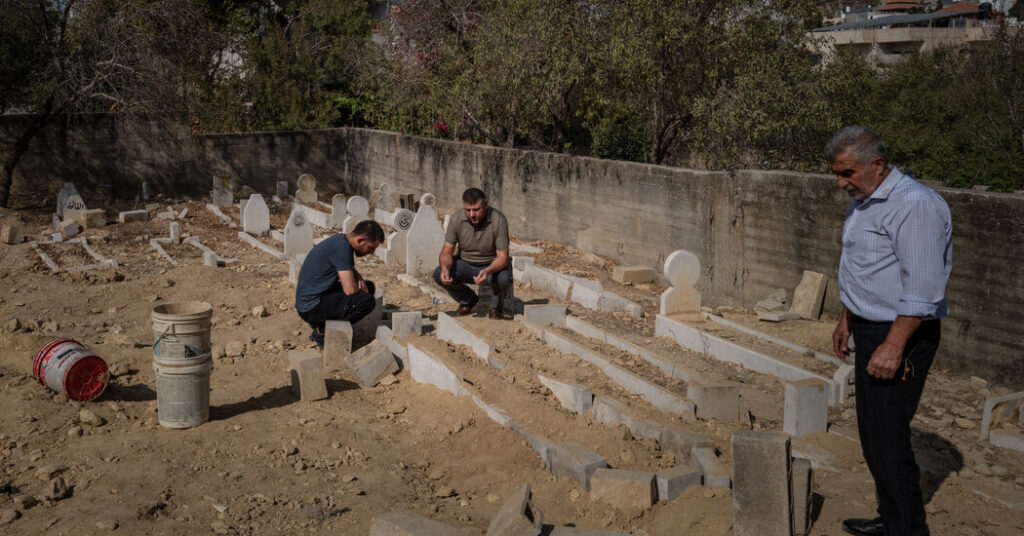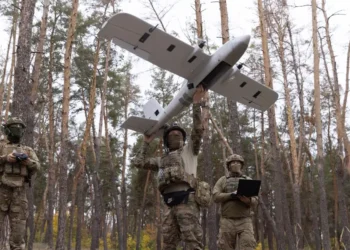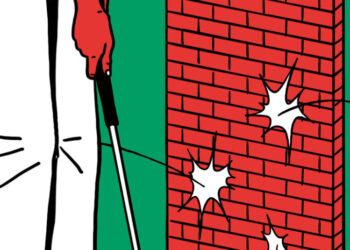Ayssam Ma’ala, a happy-go-lucky eighth grader, had just laid down tarps to gather ripe olives in the West Bank town of Beita. It was Oct. 11, the first Saturday of the harvest, traditionally a high point of the year.
The day before, his family had been driven from another grove by extremist settlers who attacked them, witnesses said, in what has become a common occurrence in the West Bank. So on Saturday, they chose what seemed a safer spot. No settlers were in sight. Ayssam, 13, told his mother to rest in the shade, that “he’d take care of everything.”
Israeli soldiers soon emerged from an army vehicle a few hundred yards away and began firing tear gas, witnesses said. Caught in a cloud of gas from three canisters, and unable to breathe, Ayssam collapsed.
After four weeks in a coma, Ayssam died on Tuesday. He became the first fatality in what has been a particularly violent olive harvest. Palestinians and activists — Palestinian, Israeli and Western — say bands of masked settlers have routinely assailed Palestinian villagers, as well as activists lending their support, and journalists there to bear witness. The attackers, they say, are emboldened by permissive law enforcement and by troops who seldom intervene to stop Jewish extremists.
The olive harvest has been central to the livelihoods of hundreds of thousands of Palestinians for generations. A good crop can keep a family afloat financially for a year, and bringing it in once meant picnics, togetherness and cookouts among the trees.
The Israeli military insists that its soldiers are under orders to allow the harvest, but activists say that the military often sides with the settlers or even tries to disrupt the harvest itself. Israeli military leaders have come under heightened pressure to crack down on settler violence, with some commanders saying they need the government to authorize harsher measures.
In Beita, members of Ayssam’s family speculated that the violence of the day before had prompted soldiers to disperse them pre-emptively. A military spokeswoman said that the incident was under review.
Palestinians see the violence, and its tolerance by right-wing Israeli officialdom, as part of a broader campaign to harass them and make life so unbearable that they will eventually abandon their villages.
At the same time, Israeli settlements have cropped up at record speed on hilltops encroaching on villages across the West Bank.
The violence and land grabbing in the West Bank have only intensified since the Hamas-led Oct. 7, 2023, attack on southern Israel, which set off the war in Gaza.
Settler violence reached an all-time high in October, with 264 attacks, or about eight a day, according to the United Nations Office for the Coordination of Palestinian Affairs, which began keeping records in 2006.
The office has counted 167 attacks on olive harvesters since Oct. 1, in which 151 Palestinians were injured, 83 of them by Israeli settlers and the rest by soldiers. It said the violence has affected more communities — and also more olive trees — than in the past six years.
In an attack caught on video and published in Israeli media, a woman harvesting olives in Turmus Aya, Afaf Abu Alia, 53, was beaten unconscious on Oct. 19 by a masked Israeli man wielding a club. On Sunday, the police arrested a suspect. Israeli media identified him as a 21-year-old resident of a nearby outpost.
A man trying to harvest olives in Kufr Qaddum, Hekmat Shtewei, 51, was chased to his car by settlers on Oct. 28, according to his brother-in-law, Abd Al-Rahman Shtewei, who said he found him bleeding in his car. He was beaten so badly that he suffered multiple fractures to his skull, jaw, ribs, arms and legs, and slipped into a coma, according to a hospital report. He awoke only on Tuesday, his brother-in-law said.
“What’s happening in the West Bank is a disgrace to humanity,” Abd Al-Rahman Shtewei said in an interview. “People here will not feel safe except in their graves.” The Israeli military did not respond to requests for comment.
He lamented, too, that Palestinians could not fight back in defending themselves. “Legally, we would be the ones charged,” he said. “All we can do is keep showing up on our land.”
Israeli and Western activists who join the olive harvest and journalists who are there to document the attacks have also been assaulted.
Last weekend, Israeli activists joined villagers trying to harvest olives on a terraced hillside in Beita, when settlers began throwing rocks at them and beating some people with sticks. The injured included a Reuters photographer and her security adviser..
Oded Yedaya, 76, a photographer who runs an art school in Tel Aviv, was also wounded. He said he ran off to the side hoping to take pictures of the attackers but was chased down a steep hill by two of them and struck with at least two stones.
The first one hit him in the lower back. “I turned my head and yelled, ‘Criminals, leave me alone,’” he said in an interview.
The second stone knocked him out. He awoke covered in blood, his camera gone. He had a two-inch gash on his temple and a broken cheekbone.
Mr. Yedaya has attended olive harvests and political protests for many years and has been injured a few times. “This is the worst,” he said.
The Israeli military did not respond to requests for comment.
Jonathan Pollak, an Israeli organizer of Zeitoun 2025, a coalition of groups supporting the olive harvest, said the Oct. 7 attacks and the Gaza war had fueled hatred and fear of the Palestinians on the part of many Israelis, distracted international attention from the West Bank and created among extremist settlers “a sense of entitlement, and of seizing the moment.”
“There’s a very, very strong sense of impunity, and lack of accountability,” Mr. Pollak said.
This year’s olive crop was already anemic, a result of drought last year, a spring heat wave and strong winds that blew many buds from the trees — reducing the economic incentive for people to go through with the harvest.
Some Palestinians tried to persist. But they say many of them have been prevented from getting to their trees, whether by armed settlers who menace them or by soldiers deployed to protect the settlers.
The military says its soldiers are under orders to ensure the harvest’s continuation without interference. It acknowledges that in some areas of conflict, access to groves is restricted to landowners only, “to prevent friction.”
But Palestinians and activists say that soldiers in the field routinely declare whole swaths of land, well outside the designated areas, as “closed military zones” — which makes entering them a crime — for no other purpose than stopping villagers from getting to their trees.
And getting to those trees is vital: Under Israeli law, farmlands that go uncultivated for several years can be seized permanently by the state, and often are.
Among the groups expressing solidarity with Palestinians trying to harvest olives is Rabbis for Human Rights, a liberal Jewish group that has sent volunteers to the West Bank dozens of times this fall.
On Oct. 28, two American women who tried to join up with the group in the West Bank village of Burin were arrested after soldiers said they had entered a closed military zone.
Leila Stillman-Utterback, 18, who was in Israel on a gap year after graduating from high school in Vermont, said she and the other American — both in Israel on tourist visas — were deported three days later and barred from returning to Israel for 10 years. In an interview, she said she felt a “sense of betrayal” but was fighting the ban in court because she felt “an imperative to be there.”
In Beita, Ayssam and his family had tried to harvest olives on the first Friday of the season, Oct. 10, his relatives — including his mother, brothers, and uncles — said. They were driven off by the attacking settlers from a new outpost called Mevaser Shalom — Hebrew for “harbinger of peace.”
The next day, Ayssam woke up saying he wanted to go olive picking again, his mother, Ghuroub Hamayel, said in an interview. An older brother argued against it, worried about another attack, but Ayssam insisted.
They chose an olive grove farther away from the outpost, hoping to be left alone, Ms. Hamayel said.
Eran Maoz, an Israeli activist who arrived with another group of olive pickers on the same hillside earlier that morning, said soldiers drove by a few times and observed the activity but took no action. He said the harvesters assumed they had permission to be where they were.
The family had barely arrived and gotten started when the soldiers returned. This time, they got out of their vehicle.
“We started packing up our stuff,” Ms. Hamayel said. “But that’s when they started shooting the gas.”
In a video recorded by Mr. Maoz that he shared with The New York Times, one of the villagers responded by yelling at the soldiers, “Don’t fire tear gas! You’re killing us here!”
A soldier answered over a bullhorn: “We don’t want to use tear gas. Go, get out of here, beat it.” But the soldiers continued to fire tear gas, Mr. Maoz said, and one of those volleys overcame Ayssam.
A hospital report obtained by The Times said that inhaling tear gas caused his heart to stop for several minutes and that he suffered from severe oxygen deficiency, requiring the use of a ventilator.
He was buried within hours of his death Tuesday night in a family plot not far from his home. The next morning, as other relatives remembered his smile, or his love of video games, or the way he once stared down Israeli soldiers who harassed him, his mother instead recalled her youngest child’s sweetness.
“He used to ask me, ‘Mom, do you love me like I love you?’” Ms. Hamayel said. “And I’d say yes.”
Rawan Sheikh Ahmad contributed reporting.
David M. Halbfinger is the Jerusalem bureau chief, leading coverage of Israel, Gaza and the West Bank. He also held that post from 2017 to 2021. He was the Politics editor of The Times from 2021 to 2025.
The post A Bloody Month in the West Bank Olive Harvest Leads to the Death of a Boy appeared first on New York Times.




